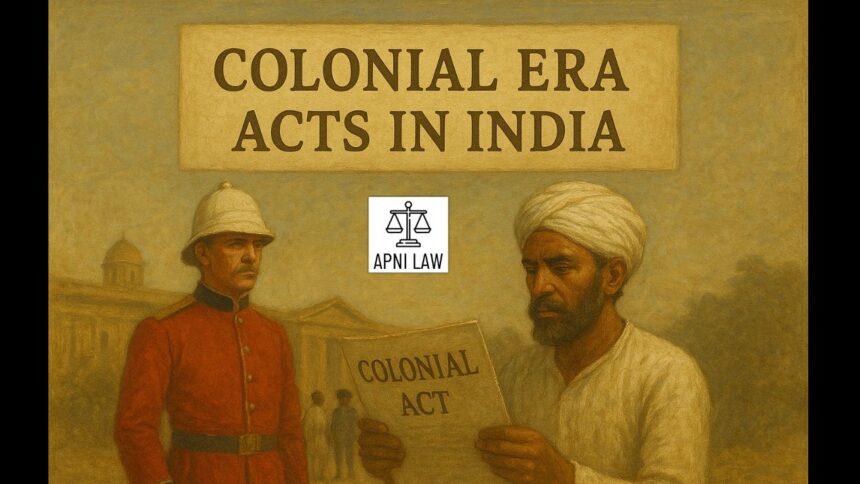Introduction
The Nehru Report of 1928 holds a special place in India’s constitutional history. For the first time, Indian leaders drafted a constitutional framework for the country without British involvement. The report was named after Motilal Nehru, who chaired the committee that prepared it, but its significance goes far beyond his leadership. It represented India’s desire to prove that its people were capable of self-rule and of framing their own destiny. Even though the report did not satisfy everyone, it laid the foundation for later debates on independence, democracy, and constitutional governance.
Background to the Report
The Nehru Report came as a direct response to the Simon Commission of 1927. The British government had appointed an “all-white” commission to review the Government of India Act 1919, excluding Indians from participating in discussions about their future. Outraged by this, Indian leaders decided to take matters into their own hands. At the All Parties Conference in 1928, political groups agreed to draft a constitution for India. A committee headed by Motilal Nehru, with members such as Jawaharlal Nehru, Tej Bahadur Sapru, and Subhas Chandra Bose, was formed to prepare the draft. Their report became India’s first serious constitutional proposal written entirely by Indians.
Main Proposals of the Nehru Report
The Nehru Report proposed dominion status for India within the British Commonwealth, similar to Canada or Australia. It called for a parliamentary system of government with a bicameral legislature. Fundamental rights such as freedom of expression, equality before law, and protection of minorities were emphasized. The report also recommended universal adult suffrage, though this was to be achieved gradually.
One of the most debated aspects of the report was its rejection of separate electorates for minorities. Instead, it suggested joint electorates with reserved seats for minorities in certain cases. This decision angered the Muslim League, which insisted on retaining separate electorates. The divide between Congress and Muslim League on this issue widened after the report, setting the stage for future disagreements.
Political Reactions to the Report
The report received mixed reactions. The Indian National Congress welcomed it as a progressive step toward self-government. Leaders such as Jawaharlal Nehru and Subhas Chandra Bose, however, felt that asking only for dominion status was too moderate. They demanded complete independence. On the other hand, the Muslim League and other minority groups opposed the report because it rejected separate electorates. Mohammad Ali Jinnah put forward his famous “Fourteen Points” in response, highlighting the League’s objections.
Despite these divisions, the Nehru Report showed that Indians were now willing and able to draft a constitution on their own. It represented a shift in the nationalist movement from agitation to serious constitutional planning.
Significance of the Nehru Report
The Nehru Report was significant for many reasons. It was the first constitutional framework prepared by Indians without British involvement. It introduced concepts such as fundamental rights and parliamentary government that later became pillars of the Indian Constitution. By rejecting separate electorates, the report attempted to strengthen national unity, even though it deepened divisions with the Muslim League. Most importantly, it symbolized Indian political maturity at a time when the British still doubted India’s capacity for self-rule.
Although the British government ignored the report, its impact on the freedom struggle was profound. It gave the Congress a platform to demand greater reforms, and when the demands were rejected, it led directly to the call for complete independence at the Lahore Session of 1929.
Criticism of the Nehru Report
The Nehru Report faced criticism from multiple directions. The Congress radicals criticized it for being too soft and for asking only for dominion status instead of full independence. Minority communities criticized it for rejecting separate electorates, which they considered essential for safeguarding their interests. The British dismissed the report altogether, refusing to acknowledge that Indians could prepare their own constitutional framework.
These criticisms meant that the report could not become a unifying document for all Indians. Instead, it exposed divisions that would later influence India’s path to independence.
Long-Term Legacy
Even though the Nehru Report was never implemented, its legacy endures. It was the first Indian-led attempt to draft a constitutional framework. Many of its ideas, such as fundamental rights, a parliamentary system, and equality before law, reappeared in the Constitution of 1950. The report also highlighted the growing determination of Indians to take charge of their own political future. By refusing to accept reforms dictated by Britain, it moved the struggle closer to independence.
The differences it created between Congress and the Muslim League also shaped future politics. The demand for separate electorates eventually found a place in the Government of India Act 1935 and later contributed to the partition of India. In that sense, the Nehru Report showed both the potential and the challenges of creating a unified constitutional vision for a diverse country.
Questions and Answers
Q1. What was the Nehru Report of 1928?
The Nehru Report was the first constitutional framework drafted by Indians without British involvement. It proposed dominion status, fundamental rights, and a parliamentary system of government.
Q2. Why did the Muslim League oppose the Nehru Report?
The Muslim League opposed the report because it rejected separate electorates for minorities. The League believed this would weaken minority representation in politics.
Q3. Why is the Nehru Report important in Indian history?
The Nehru Report is important because it represented India’s first serious attempt at framing a constitution. Although it was not accepted, it introduced ideas that influenced the final Constitution of India.
Conclusion
The Nehru Report of 1928 remains a milestone in India’s constitutional history. It was not perfect, and it failed to unite all communities, but it marked a turning point. For the first time, Indians themselves drafted a constitutional plan, showing both political maturity and determination. The report also triggered sharper debates on independence, minority rights, and the ultimate goal of the nationalist movement. Though it was ignored by the British, its legacy lived on in the demand for Purna Swaraj in 1929 and in the constitutional principles that shaped independent India.
For any specific query call at +91 – 8569843472







